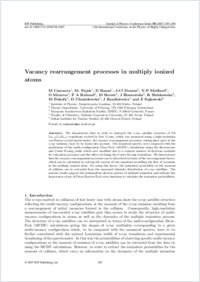Vacancy rearrangement processes in multiply ionized atoms
- Czarnota, M. Institute of Physics, Świȩtokrzyska Academy, Kielce, Poland
- Pajek, M. Institute of Physics, Świȩtokrzyska Academy, Kielce, Poland
- Banas, D. Institute of Physics, Świȩtokrzyska Academy, Kielce, Poland
- Dousse, Jean-Claude Physics Department, University of Fribourg, Fribourg, Switzerland
- Maillard, Yves-Patrick Physics Department, University of Fribourg, Fribourg, Switzerland
- Mauron, Olivier Physics Department, University of Fribourg, Fribourg, Switzerland
- Raboud, Pierre-Alexandre Physics Department, University of Fribourg, Fribourg, Switzerland
- Berset, Michel Physics Department, University of Fribourg, Fribourg, Switzerland
- Hoszowska, Joanna European Synchrotron Radiation Facility (ESRF), Grenoble, France
- Slabkowska, K. Faculty of Chemistry, Nicholas Copernicus University, Toruń, Poland
- Polasik, M. Faculty of Chemistry, Nicholas Copernicus University, Toruń, Poland
- Chmielewska, D. Sołtan Institute for Nuclear Studies, Otwock-Świerk, Poland
- Rzadkiewicz, J. Sołtan Institute for Nuclear Studies, Otwock-Świerk, Poland
- Sujkowski, Z. Sołtan Institute for Nuclear Studies, Otwock-Świerk, Poland
-
2007
Published in:
- Journal of Physics: Conference Series. - 2007, vol. 58, no. 1, p. 295
English
We demonstrate that in order to interpret the x-ray satellite structure of Pd Lα1,2(L₃M4,5) transitions excited by fast O ions, which was measured using a high-resolution von Hamos crystal spectrometer, the vacancy rearrangement processes, taking place prior to the x-ray emission, have to be taken into account. The measured spectra were compared with the predictions of the multi- con.guration Dirac-Fock (MCDF) calculations using the fluorescence and Coster- Kronig yields which were modiffed due to a reduced number of electrons available for relaxation processes and the effect of closing the Coster-Kronig transitions. We demonstrate that the vacancy rearrangement processes can be described in terms of the rearrangement factor, which can be calculated by solving the system of rate equations modelling the flow of vacancies in the multiply ionized atom. By using this factor, the ionization probability at the moment of collision can be extracted from the measured intensity distribution of x-ray satellites. The present results support the independent electron picture of multiple ionization and indicate the importance of use of Dirac-Hartree-Fock wave functions to calculate the ionization probabilities.
- Faculty
- Faculté des sciences et de médecine
- Department
- Département de Physique
- Language
-
- English
- Classification
- Physics
- License
-
License undefined
- Identifiers
-
- RERO DOC 8328
- DOI 10.1088/1742-6596/58/1/065
- Persistent URL
- https://folia.unifr.ch/unifr/documents/300465
Statistics
Document views: 188
File downloads:
- pdf: 157
